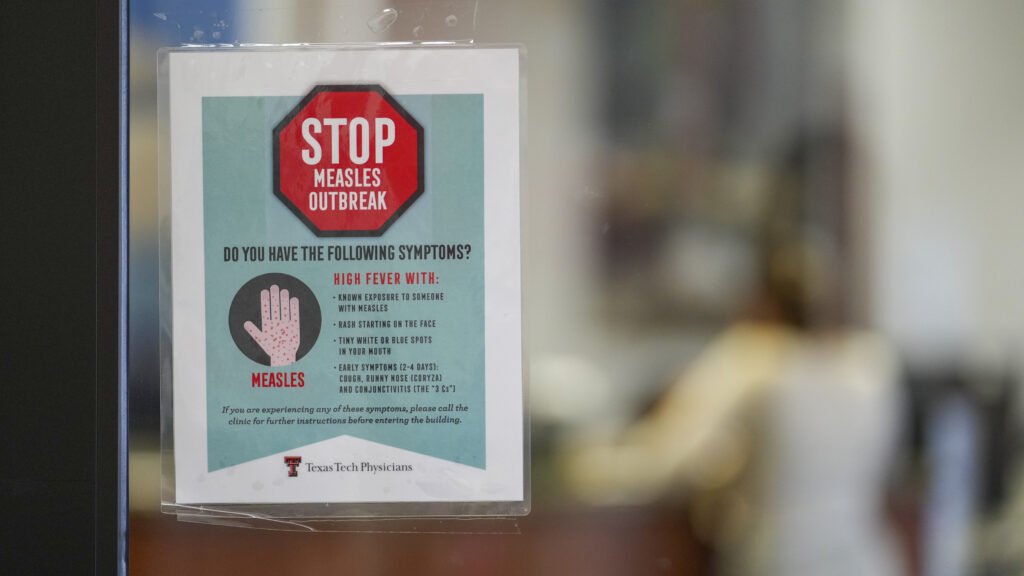The Importance of Vaccination in Public Health Messaging Amid Measles Outbreak
In 2019, during a measles outbreak in New York, federal health officials emphasized the importance of immunizations. CDC Director Robert Redfield and Health Secretary Alex Azar both urged the public to get vaccinated, with President Trump also endorsing the necessity of vaccinations. However, the messaging from the new Trump administration regarding the recent measles outbreak in Texas has been different.
During a Cabinet meeting, when asked about the growing measles outbreak in Texas, which has claimed the life of one unvaccinated child, President Trump redirected the question to his health secretary, Robert F. Kennedy Jr., a longtime vaccine critic. Kennedy downplayed the outbreak, misstated the number of deaths, and failed to emphasize the importance of vaccination in controlling the spread of measles.
Despite the reporter not specifically mentioning vaccines in the question, public health officials typically use such opportunities to stress the significance of immunizations. Majority of the cases in the Texas outbreak are in unvaccinated individuals. Experts expressed surprise at the lack of public health messaging from the administration, as previous secretaries of Health and Human Services would have used such instances to promote vaccination and support local efforts.
Kennedy mentioned a government post on the outbreak, but it was unclear what he was referring to. The CDC later released a statement on the outbreak, reiterating the importance of vaccination in controlling measles but lacked the urgency seen in previous communications.
While state and local authorities lead the response to outbreaks, experts expect federal officials, including the CDC, to reinforce the importance of vaccines in public communications. Senator Bill Cassidy, a physician and advocate for vaccines, has been vocal about the necessity of vaccinations during the Texas outbreak.
The lack of messaging from the executive branch on the importance of vaccines has raised concerns among public health experts. The silence from the CDC and the administration regarding vaccination and outbreak control has led to fears that skepticism towards public health measures, such as vaccination, may increase.
In conclusion, the importance of vaccination in controlling outbreaks like measles cannot be understated. Public health officials must continue to emphasize the effectiveness of vaccines in preventing disease spread and protecting individuals and communities. Communication and education are vital in ensuring public trust in vaccination and maintaining herd immunity against preventable diseases. The recent outbreaks of measles in Texas and New Mexico have raised concerns among experts about the response from the Centers for Disease Control and Prevention (CDC). Despite the severity of the situation, the CDC has been largely silent on the matter, failing to communicate the risks of the disease and the importance of vaccines to the public.
Paul Offit, a vaccine expert at Children’s Hospital of Philadelphia, expressed his disappointment in the CDC’s lack of communication during this critical time. He emphasized the need for a CDC spokesperson to address the media and provide information about the ongoing outbreaks. However, the CDC has redirected inquiries about their response to the Department of Health and Human Services (HHS), leaving many questions unanswered.
While both states’ health departments have been urging people to ensure they are vaccinated as the best protection against measles, the absence of a unified message from the CDC and other health officials has created confusion and doubt among the public. In a time when vaccine hesitancy is a growing concern, consistent and clear messaging is crucial to combat misinformation and promote vaccination.
The delay in confirming Dave Weldon as the new CDC director has also added to the uncertainty surrounding the agency’s stance on the outbreaks. Weldon, who has previously expressed concerns about vaccine safety, may not provide the necessary leadership needed to address the current situation effectively. This lack of leadership and guidance from the CDC only serves to exacerbate the growing measles outbreak.
The severity of the Texas measles outbreak, which has already resulted in the tragic death of a child, underscores the urgent need for a stronger response from health authorities. The rapid increase in cases and the potential for further spread highlight the importance of proactive measures to contain the outbreak. Without a coordinated effort and clear communication from the CDC, the situation may continue to escalate.
In conclusion, the CDC’s failure to address the risks of measles and promote vaccination during the current outbreaks is a cause for concern. As health officials work to contain the spread of the disease, it is essential for the CDC to take a more proactive role in educating the public and advocating for vaccination. By providing accurate information and guidance, the CDC can help prevent future outbreaks and protect the health of individuals and communities.


